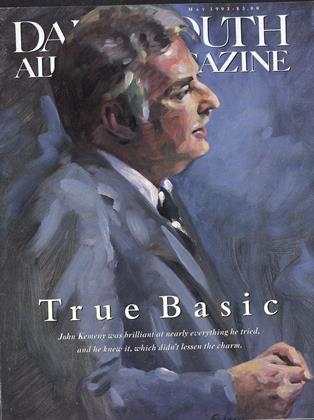GRADUATION WAS A year ago, but I'm still defending Dartmouth to almost everyone I meet. (Here in North Carolina most people only know about the campus controversies of the eighties.) So when I was asked to write about my school for the new edition of Insider's Guide to theTop 50 Colleges, it was as though I had been given a clean slate: a chance to stake Dartmouth's claims to fame and dispel the myths that surround them.
The assignment wasn't easy. Writing about Dartmouth forced me to examine the highlights and lowlights of my years there everything from the exuberance I had on freshman trips to the 10 (out of 100) I scored on my first physics test; from the thrill of presenting (and later finishing) my thesis to the poignant goodbyes during graduation week. I scrutinized the College (and my own experience) under a microscope, and found both beauty marks and blemishes
I discovered that today's Dartmouth isn't the Dartmouth of my freshman year, when the Insider's Guide was last published. The authors of the previous Insider's Guide essay wrote that Dartmouth was "coming to grips with its past, discarding some traditions and reaffirming others." By the second page they had already referred to shantybashing on the Green, the Indian symbol, the "deemphasis" of fraternities, and The Dartmouth Review before giving any mention to academics.
My examination of Dartmouth looked toward the future rather than the past. From new facilities to a new curriculum and a strengthened emphasis on research between students and faculty, I concluded that Dartmouth had evolved far beyond the shanty incidents and Review-bashing of the eighties. I wrote that it had found its niche as a "college in a rural environment with a devoted faculty of mentors who are firmly committed to undergraduate education."
Of course, both tradition and controversy are as much a constant at Dartmouth as is undergraduate education: they both trace back over 200 years. In die previous Insider's Guide essay, the authors wrote that campus controversy "has become a debate on the future of the College: How far should Dartmouth stray from its traditions?" I'd agree that the College is still examining its history: one section of my essay explains how the '92s replaced the clay pipe tradition with a midnight candlelight ceremony on the Bema. But the future of the College, I'd also argue, is no longer dependent on the rituals of its past.
The book with my essay in it will be published this fall. The sad thing is, four years from now it will need to be revised again. Or maybe it isn't so sad; whoever writes the book on Dartmouth in 1997 will also be working from a clean slate.
JONATHAN DOUGLAS, a former Whitney CampbellIntern at this magazine, isnow an editorial assistantfor Duke Magazine.
 View Full Issue
View Full Issue
More From This Issue
-
 Feature
FeatureAcross the River, Rising
May 1993 By Ed Gray '67, T '71 -
 Cover Story
Cover StoryTrue Basic
May 1993 By Nardi Reeder Campion -
 Feature
FeatureThe Man Who Took Over Dartmouth
May 1993 By John Scotford Jr. '38 -
 Article
ArticleWomen in Love
May 1993 By Katharine Gingrass-Conley -
 Article
ArticleA Postponed Power
May 1993 By James O. Freedman -
 Article
ArticleDr. Wheelock's Journal
May 1993 By E. Wheelock







